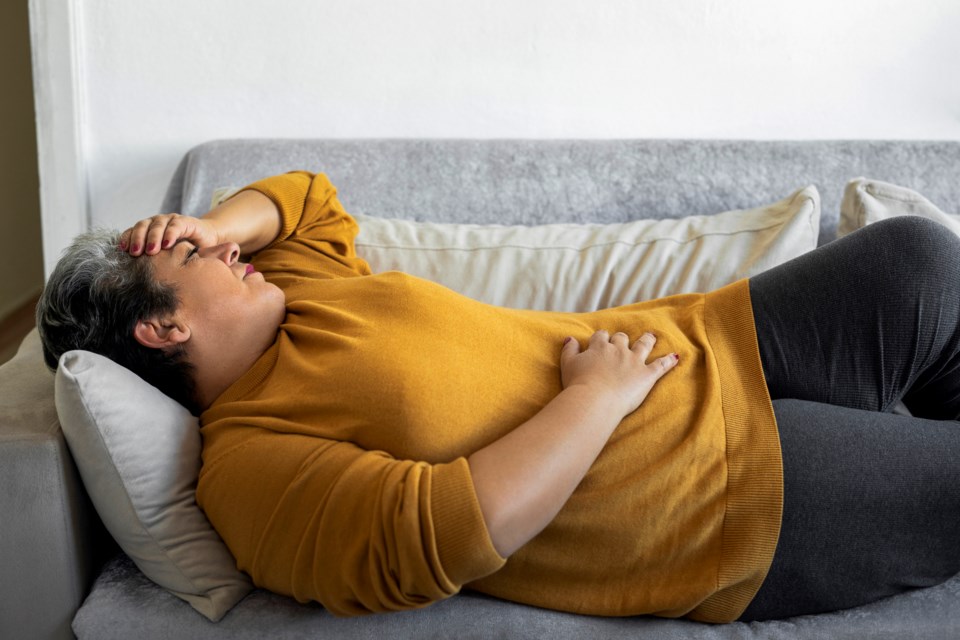If you suffer after eating or have had gastrointestinal symptoms that are ongoing despite your healthy digestive regime you may have gallbladder issues like biliary stasis or sluggish bile.
Even without the intense pain of gallstones, you may be in preliminary gallbladder distress and your body may be having a hard time digesting fat. A build-up of fat in the digestive tract can damage the intestinal walls, cause digestive issues, and cause microbiome imbalances. Gallstones may follow.
The gallbladder and liver work together in our bodies. The liver (our largest organ) produces bile, a powerful digestive juice needed for the digestion of fats in our diets. The gallbladder is a very small organ located next to the liver. Its role is to concentrate and store bile so it is readily available for use when needed.
When the fat we eat enters the duodenum (upper part of our small intestine), the gallbladder releases the 10x concentrated bile through the bile ducts to help digest the fat. Carbohydrates and proteins are easier to digest than fat, as fats require bile in order to be broken down and converted to energy.
Gallstones, which are small deposits of cholesterol (bilirubin) occur in 20% of adult women and 10% of adult men in Canada. They occur mostly in women over 40 who have had children, are obese, insulin-resistant or have rapidly lost weight. They occur after eating dietary fat and cause severe abdominal pain and sometimes fever and jaundice.
Left untreated, gallstones can lead to gallbladder cancer. The most common treatment for chronic gallstones is removal of the gallbladder. This procedure is one of the most common surgeries in North America and luckily it is now done laparoscopically rather than a huge abdominal incision. I had my gallbladder removed 25 years ago and was one of the first laparoscopic procedures in the Maple Ridge hospital. But nobody educated me about dietary changes.
Even though the gallbladder has an important function, it’s not considered a vital organ and we can survive without it.
With no gallbladder, bile flows directly from the liver to the duodenum to digest any consumed fat. But, because it is not in its concentrated form, it is not as effective and fat digestion may take longer.
Lack of bile can cause negative symptoms, including diarrhea, bloating, indigestion and tiredness after eating, foul-smelling stools that are lighter in colour, and nutrient deficiencies. The most recommended supplements are ox bile or other bile salts and pancreatic lipase enzymes to help break down fat.
The decreased ability to digest fat causes compromised absorption of the essential fatty acids (omegas), fat-soluble vitamins (D, E, A and K), B12 and magnesium. It is important for those without a gallbladder to supplement these vitamins, take complete digestive enzymes, a good probiotic and lipase. As there is a chance of compromised liver function after gallbladder removal, liver support is also recommended. I regularly take milk thistle and drink teas with dandelion root.
Without our gallbladder, not only do we have an increased risk of digestive issues, but we may have a greater risk of developing fatty liver (the non-alcoholic kind).
We must consider our diet and eating habits and cut down or eliminate fatty fried foods, watch our sugar and dairy intake, eat smaller meals, take our digestive enzymes, probiotics, and bile supplements, and compensate for the lack of absorbed vitamins.
We still need fats but they should be consumed sparingly and be more the mid-chain variety like coconut oil.
Please avoid hydrogenated fats as they are very hard to digest and extremely inflammatory to the body.
In a future article, I will discuss the vital role of fats and how to discern healthy vs. harmful fats. A full list of articles and links on various health topics can be found on the Published Articles page of www.elixirforlife.ca.
Claire Nielsen is a health coach, author, public speaker and founder of www.elixirforlife.ca. The information provided in the above article is for educational purposes only and is not a substitute for professional health and medical advice. Please consult a doctor, health-care provider or mental health practitioner if you're seeking medical advice, diagnoses and/or treatment.



